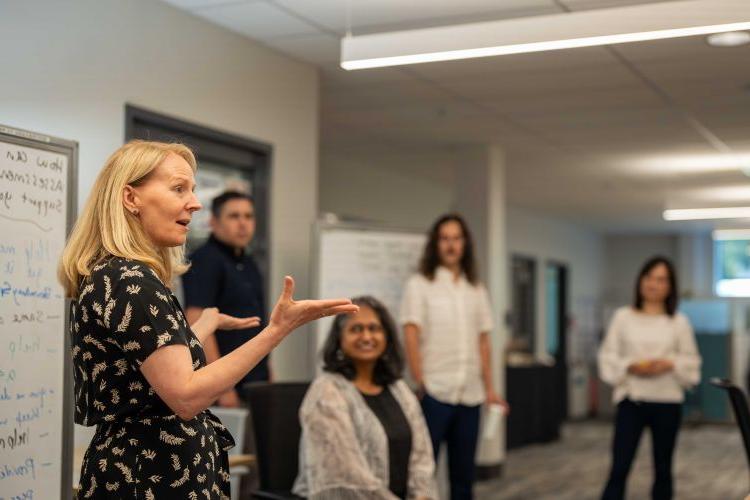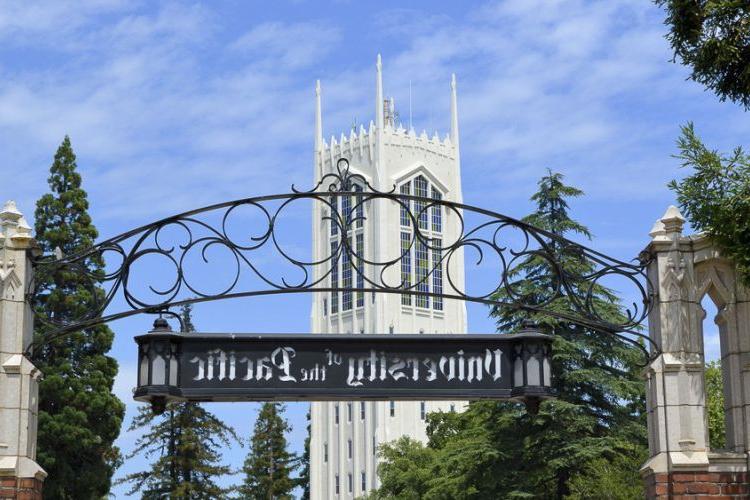面包屑
Faculty Fellows program embraces the science of learning

On the right, Leslie Bayers participates in a Faculty Fellows program meeting.
A new fellowship program at University of the Pacific is taking a scientific look at teaching to better adapt to the unique learning needs of 21st century students.
Faculty members in the Center for Teaching and Learning Faculty Fellows program will conduct re搜索 into different ways of teaching and learning by working with colleagues from other disciplines.
“We are constantly looking for ways to better serve our students, so the findings from this program will be immensely valuable,” said Gretchen Edwalds-Gilbert, provost and executive vice president for academic affairs. “The way in which current students learn has dramatically changed, so we want to evolve alongside them to make sure they are well-equipped with the right learning environment and skills.”
Eight professors—each from a different school or department—were selected for the two-year program, which began with a retreat in mid-May.
"This initiative enhances student success by providing a richer, more supportive learning environment.” - Niraj Chaudhary, dean of the William Knox Holt Memorial 图书馆 and Learning Center
Several of the eight fellows will focus on teaching with technology, including artificial intelligence, while others will explore areas such as students’ self-directed learning and equitable assessment.
“There is not only an art but also a science involved with teaching,” said Leslie Bayers director of the Center for Teaching and Learning. “So much re搜索 in recent years has come out supporting innovative, equitable and learner-centered teaching approaches.”
Bayers designed the program along with David Yu, director of academic technology, 和尼古拉斯·麦康奈尔, director of academic assessment. “I am excited to get this off the ground. The faculty members chosen are outstanding,” Bayers said.
The Faculty Fellows are:
- Andrew Conklin, Conservatory of Music
- Osvaldo Jimenez, School of Engineering and Computer Science
- Preeti Oza, School of Health Sciences (Physical Therapy)
- Wenjing Ouyang, Eberhardt School of Business
- Greg Rohlf, College of the Pacific (历史)
- Jonathan Toccoli, Benerd College
- Deepti Vyas, Thomas J. 龙药学院
- Benjamin Zeitlin, Arthur A. Dugoni School of Dentistry
Assistant Professor Andrew Conklin plans to study the ways artificial intelligence can be used in music. His specialty at the Conservatory is composition.
“I was interested in developing more expertise in artificial intelligence, and there are specific applications that are particular to our discipline,他说. “I thought it would be helpful to supplement some of the usages that the Center for Teaching and Learning has already started to offer.
“There are apps that can create music composed by generative AI. It is good for brainstorming and forming ideas. I mostly would like to understand what is out there, and then also be able to help my colleagues.”
Associate Professor Preeti Oza said she is eager to see how her physical therapy work will mesh with other fields.
“As a health care provider, I am always interested in how I can provide new tools to my patients,欧扎说. “I’m particularly interested in helping introduce a sense of agency or voice along with autonomy in the educational experience.”
Faculty members will design and implement workshops on their findings to be presented in the Center for Teaching and Learning and within their departments to share what they have learned with other faculty. They also will present at conferences and publish their findings in scholarly journals.
A new cohort of fellows will be selected each year to continually infuse new ideas and teaching strategies.
“This is a groundbreaking initiative that empowers our educators to deepen their teaching practices and collaborate effectively,Niraj Chaudhary说, dean of the William Knox Holt Memorial 图书馆 and Learning Center, which houses the Center for Teaching Learning. “最终, this initiative enhances student success by providing a richer, more supportive learning environment.”




